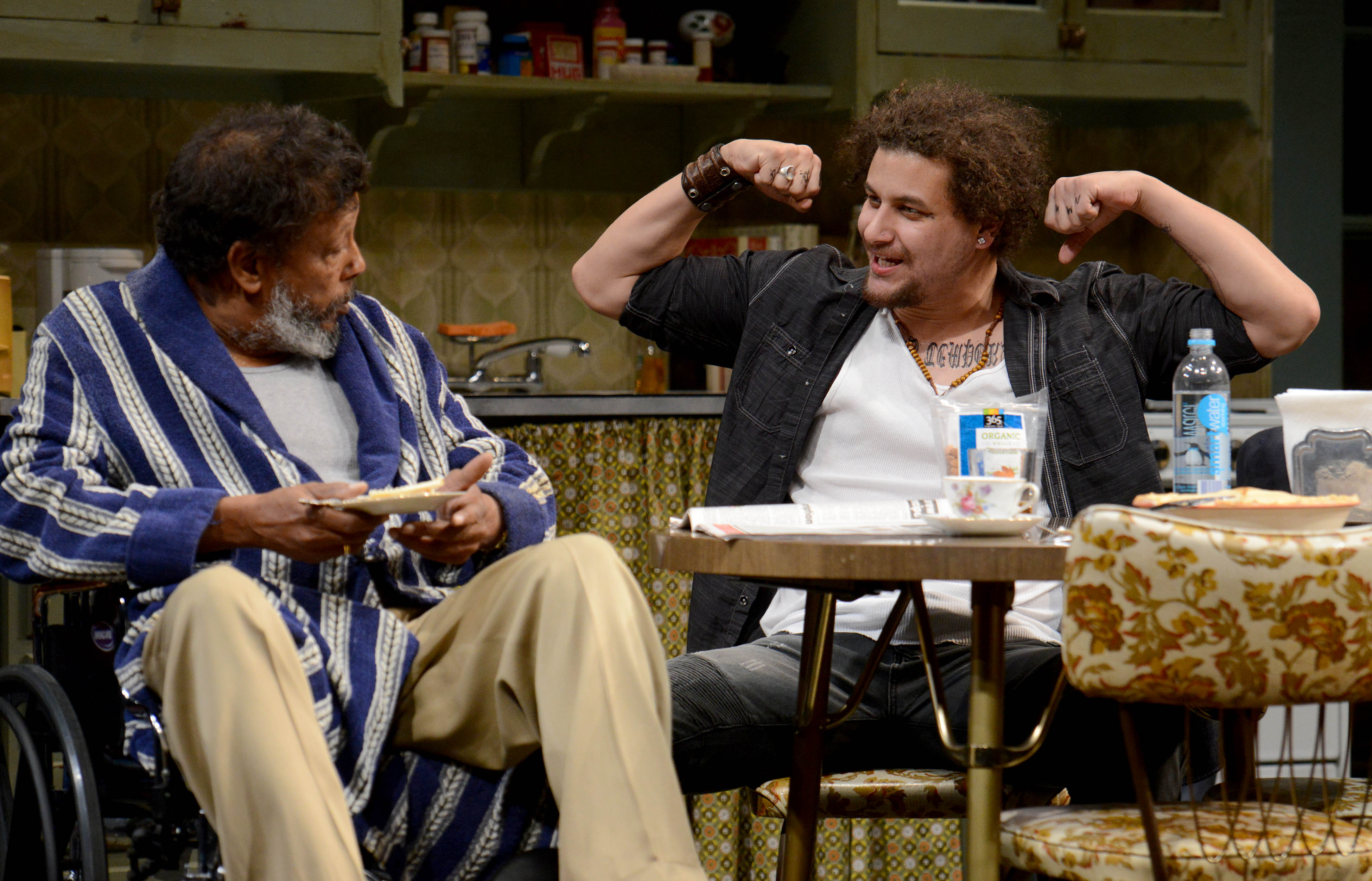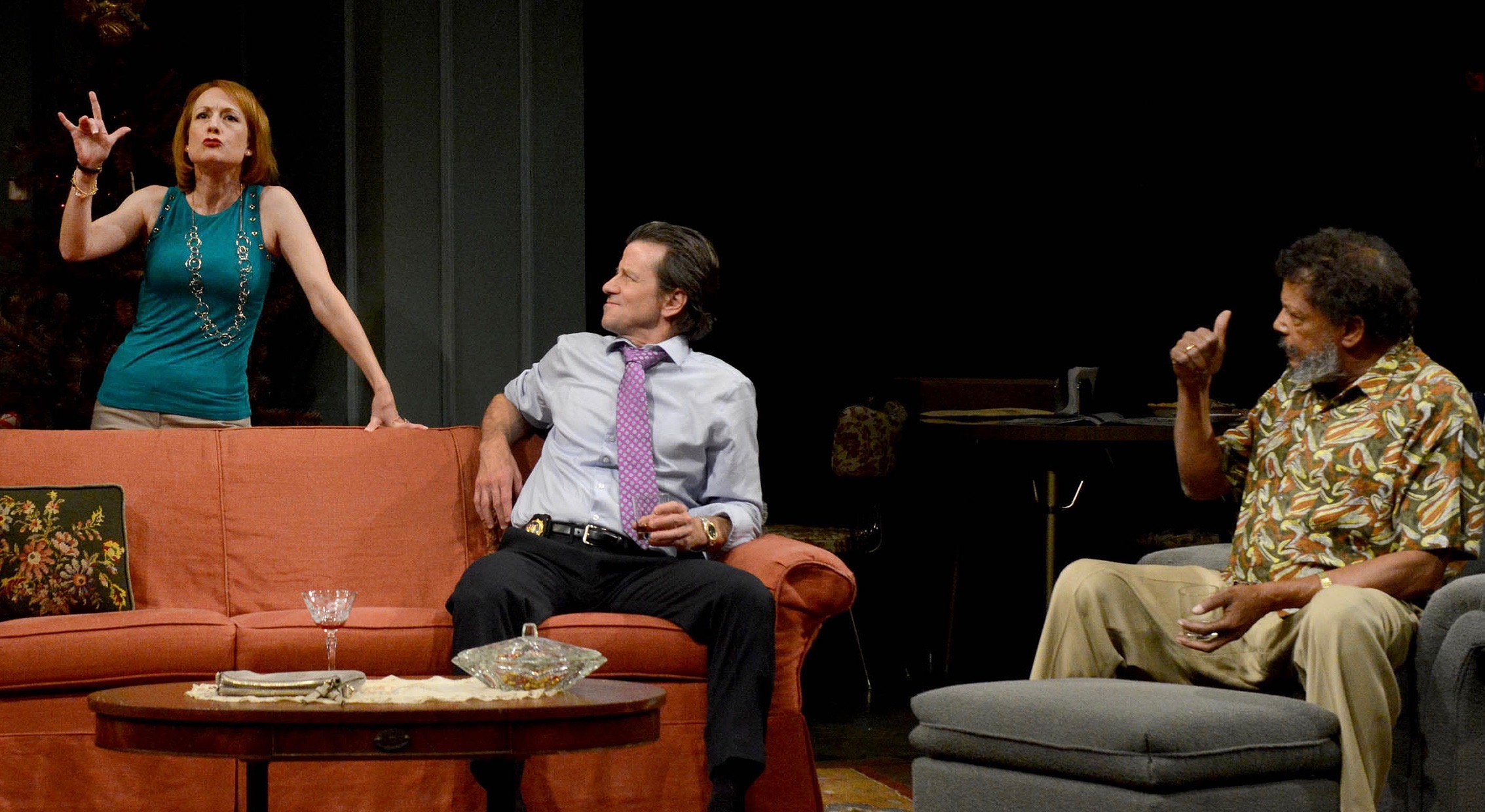‘Between Riverside and Crazy’ Is a Crazy Good Walk Along The Edge

It’s all about the nuts, man! Can young Oswaldo (Alejandro Hernandez, R) give a life lesson to old “Pops” (Eugene Lee)?
There are several reasons to see Between Riverside and Crazy at Pittsburgh Public Theater, so let’s get the standard ones out of the way first. Yes, the play won the 2015 Pulitzer Prize for Drama, which is a fine endorsement from a panel of picky people—but it doesn’t guarantee that you will like it.
Also, Between Riverside and Crazy has social relevance. The (fictional) lead character is a black ex-cop who retired from the NYPD, with disabilities, after an off-duty incident in which he was shot repeatedly by a white policeman. There’s much talk in the play about racism, an issue that cries out to be addressed—but it is not your civic duty to choose arts-and-entertainment products that address important issues. You can be an active, concerned citizen and spend your free time playing Pokémon Go, if that’s what you enjoy.
Allow me to recommend the play on other grounds. The playwright, Stephen Adly Guirgis (pronounced GEAR-giss), has become a favorite of mine to the extent that if a Guirgis play is on, I’m going. We all have such favorites: writers, filmmakers, etc. whose work we follow because we’re into the kind of artistic conversation they conduct. They deal with aspects of life that touch us, in a style that speaks to us. And Guirgis is fluent in a language that speaks strongly to me: serious stuff done funny.
For Openers, How About Some Nuts?
Consider the opening scene of Between Riverside, which introduces deep themes on waves of wackiness. The ex-cop, a cranky old cuss named Walter “Pops” Washington (played by Eugene Lee), is in a wheelchair at his breakfast table. But he’s got a soft side, for seated nearby is one of the “guests” that Pops has generously, perhaps too generously, allowed to live in his apartment—Oswaldo (Alejandro Hernandez), a bruising young ex-con and drug addict now trying to get clean in Narcotics Anonymous.
Pops, who’s on no wagon whatsoever, is wolfing down his morning meal of pie and whiskey. Whereupon Oswaldo, wanting to be helpful, delivers an extended speech as follows:
“You wanna try some of these fresh, organic raw almonds from Whole Foods instead? Because my caseworker over at the place, he’s a real ball-breaker like I told you, but ever since I took his suggestion and switched my breakfast to almonds and health water instead of, you know, Ring Dings with baloney and Fanta Grape—see, the Ring Dings and baloney and Fanta Grape, it turns out, that’s what doctors AND People magazine call emotional eating. I only ate that shit because those foods made me feel safe and taken care of, back when I was a kid who was never safe, or taken care of. But now I’m an adult, right? So I don’t gotta eat like that no more, and I can take care of myself by getting all fit and diesel … And so, I don’t wanna get all up in your business—buuut—maybe that’s also the reason you always be eating pie. Because, like, you got emotionalisms, you know?”
The social context matters here. One could imagine a similar speech in a comic scene about upscale urbanites fixated on their food. There, it’d just be predictable satire wrapped around an obvious truth (of course our feelings affect how we eat, and vice versa). But in this play, it sets the seriocomic wheels turning on a bunch of levels at once.
We have a street kid spouting therapy jargon, which strikes a tone of incongruous humor (though it happens regularly in rehab programs). We can guess that Pops is going to ridicule the whole rap, which he does, eloquently. A few minutes later, Pops explodes when asked if he wants low-sodium crackers from the store: “Low sodium my ass. High sodium! Highest possible sodium. Bring me the most extra-strength Ritz crackers the law allows.”
Meanwhile, that opening speech also sounds serious notes that will be developed more fully as the play goes along. Oswaldo is sincere. He really has lived a rat’s life of hard knocks and bad choices, and he’s tired of being a poster child for it. He dearly does wish to be a responsible “adult”—and it’ll take more than shopping at Whole Foods to do it. Moreover, he’s dead right about Pops: the old guy is torn by his “emotionalisms.”
Ring Around the Circus
We learn that Pops is juggling multiple crises of his own making. He’s filed a lawsuit against the city for damages from the shooting, which he stubbornly—perhaps too stubbornly—refuses to settle. His spacious rent-controlled apartment on beautiful Riverside Drive is an asset many New Yorkers would kill for, but he’s about to be evicted over nuisances caused by the “guests” he has taken in. They include Pops’ son Junior (Bryant Bentley), who deals stolen goods out of the back room, and Junior’s trophy non-wife Lulu (Christina Nieves).

Detective Audrey (Dawn McGee) tries to talk sense, but that is a reach with thick-headed men like her sidekick Caro (Drew Stone) and Pops around.
It’s a three-ring circus and more. The visitors to Pops’ pad include a couple of friendly white cops who are trying to help him out, or maybe not (Dawn McGee and Drew Stone), and a mysterious angel of mercy, or maybe of something else, called Church Lady (Karina Arroyave).
To say that the plot thickens is an understatement. The characters thicken too; they’re all thick with contradictions. They have good intentions and nasty habits. Everybody is in some sense both a victim and a perpetrator. And—and it is a very big “and”—everybody’s got something to hide. Telling the whole truth and nothing but is a nice idea, but who’s going to do that unless it is squeezed out of them?
Such predicaments are, of course, the universal human condition. If Riverside Drive is a metaphor for one’s little corner of paradise on earth, we’re all living between Riverside and crazy. Watching the people in this play try to walk the line, while the truths get squeezed out of them, is pretty darn funny and at the same time, moving.
And that’s what I like about serious stuff done funny. They say that if you’re not outraged, you’re not paying attention. But sometimes it takes outrageous humor to draw your attention to what’s really up. Guirgis does it; The Public has it; check it out.
Closing Credits and Ticket Info
Guirgis’ Between Riverside and Crazy is directed for Pittsburgh Public Theater by Pamela Berlin. Through December 11 at the O’Reilly Theater, 621 Penn Ave., Cultural District. For showtimes and tickets visit The Public online or call 412-316-1600.
Photos are courtesy of Pittsburgh Public Theater.
Mike Vargo, a Pittsburgh-based freelance writer and editor, covers theater for Entertainment Central.
Share on Social Media
Follow Entertainment Central
Latest Stories
Sign up for the EC Newsletter







